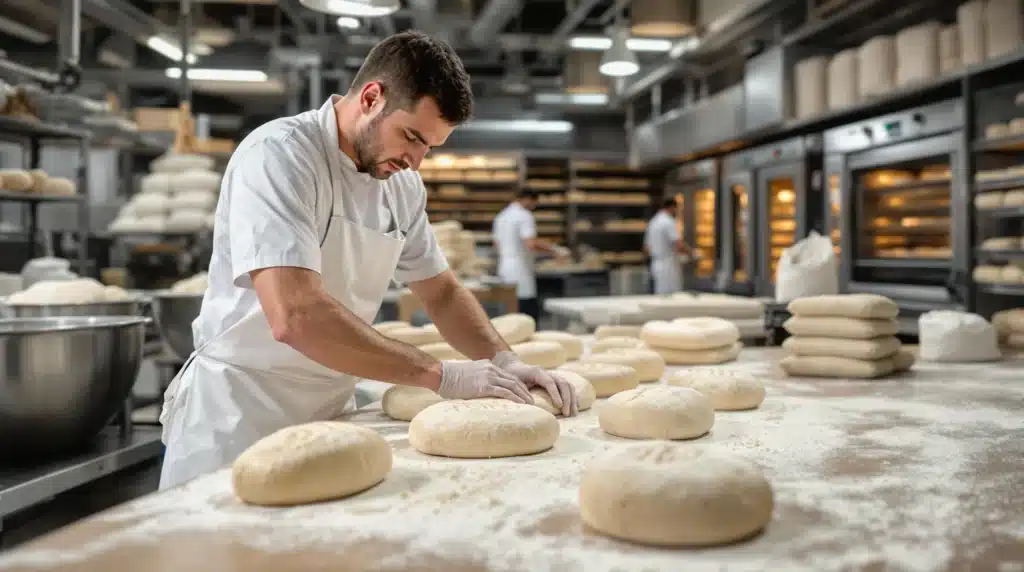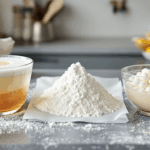The image is often romantic: a baker, dusted with flour, pulling golden loaves from a glowing oven as the sun rises, surrounded by the comforting aroma of fresh bread. It’s a picture steeped in tradition and warmth. But what does the day-to-day reality of being a professional baker or pastry cook truly entail? Does it match this idyllic vision? While the passion for the craft is often very real, the daily grind involves far more than just artistically shaping dough.
For anyone dreaming of turning their baking hobby into a career, understanding the typical rhythm, tasks, pressures, and yes, even the unglamorous parts of the job is essential. Knowing what a professional baker really does on a daily basis helps set realistic expectations and allows you to decide if this demanding yet rewarding career path is truly the right fit. So, let’s pull back the curtain and take a glimpse into a typical “day in the life.”
The Pre-Dawn Ritual: Why Bakers Start Early
One of the most defining characteristics of many baking careers, especially in bread bakeries or shops focused on breakfast pastries, is the early start. Forget hitting the snooze button; bakers are often punching the clock when most of the world is still fast asleep.
- The Alarm Clock Shock: Start times of 4 AM, 3 AM, or even 2 AM are not uncommon. Why? Because bread, especially naturally leavened or pre-fermented varieties, takes time. Long fermentation periods, proofing schedules, and the sheer volume of production needed mean the process often has to start many hours before the doors open to customers seeking fresh morning goods.
- Waking Up the Bakery: The first hour often involves a quiet, focused routine: turning on lights, firing up the massive deck ovens or rack ovens to begin the crucial preheating process, checking proofing boxes, assessing doughs that have been fermenting or retarding overnight, reviewing the day’s production list (how many loaves, types of pastries, special orders), and performing initial ingredient scaling or prep work. It’s a race against time to have everything ready for the morning rush.
Production Mode: The Core Baking Tasks
Once the bakery is awake, the core production work begins, often lasting for several intense hours. The specific tasks vary greatly depending on whether you’re in a bread-focused bakery, a pastry shop, a hotel kitchen, or a restaurant, but many common threads exist:
- Scaling & Mise en Place: Precision is paramount. Bakers spend a significant amount of time accurately weighing out ingredients (flour, water, salt, yeast, sugar, butter, eggs, etc.) for multiple batches of different recipes. This mise en place (having everything prepped and in its place) is crucial for an efficient workflow. Organization is key.
- Mixing: This involves operating large commercial mixers (spiral mixers for bread, planetary mixers for pastry/cakes). It requires understanding dough development, monitoring mixing times precisely, knowing when gluten is properly developed in bread dough, or when butter and sugar are correctly creamed for cakes and cookies. Often, multiple doughs or batters are being mixed concurrently or in sequence.
- Fermentation Management: For bread bakers, this is a constant focus. Monitoring the progress of bulk fermentation, performing scheduled folds (like stretch and folds) for dough development, managing proofing temperatures and humidity, and assessing dough readiness are ongoing tasks requiring skill and experience. For sourdough bakers, feeding and maintaining the starter is also part of the routine.
- Dividing & Pre-shaping: Large batches of dough need to be accurately divided by weight into individual portions for loaves or rolls. This is followed by pre-shaping – gently forming the portions into basic rounds or oblongs to prepare them for their final shape. Managing the bench rest between pre-shaping and final shaping is also important.
- Shaping: This is where skill and repetition shine. Bakers shape dozens or hundreds of loaves, rolls, baguettes, croissants, Danishes, or other items, aiming for consistency in size, shape, and surface tension. This requires dexterity, speed, and a good understanding of dough handling.
- Proofing Control: Loading shaped items onto racks, into proofing boxes, or onto peels. Critically assessing when each item is perfectly proofed and ready for the oven using visual cues and the poke test – timing this correctly is vital for the final rise and texture.
- Baking: The often-hot heart of the operation. This involves skillfully loading items into hot ovens (deck ovens often require loading with a peel; rack ovens involve rolling large racks in/out), managing baking times and temperatures for diverse products baking simultaneously, potentially injecting or managing steam for bread crusts, rotating items for even baking, monitoring color development, and accurately determining doneness using visual cues, feel, and internal temperature checks. Requires intense focus and multitasking.
- Pastry-Specific Tasks: For pastry cooks, the focus might be on making large batches of pastry cream, curds, fruit fillings, ganaches, various buttercreams, sponges, tart shells, choux pastry, or macarons. Assembling complex pastries, decorating cakes, tempering chocolate, or working on intricate sugar or chocolate showpieces could also be part of the day. Laminated doughs like croissant or puff pastry often involve multi-day processes of mixing, chilling, and turning.
Beyond the Bake: Finishing, Cleaning, and Teamwork
The job doesn’t end when items come out of the oven.
- Finishing & Decorating: This involves glazing warm pastries, frosting and decorating cakes and cupcakes, filling éclairs or cream puffs, slicing certain breads, arranging items attractively for the display case, or packaging products for sale. This stage requires precision, attention to detail, and often a steady hand and artistic eye.
- Cleaning is CONSTANT: This cannot be overstated. Professional kitchens prioritize cleanliness and sanitation above almost everything else. Cleaning isn’t just an end-of-shift task; it’s integrated throughout the entire workday. This includes wiping down work surfaces constantly, cleaning spills immediately, washing mixing bowls, utensils, and small equipment between uses, scraping down dough troughs, maintaining organized stations, and performing regular deep cleaning of mixers, ovens, proofers, floors, and storage areas. Expect to spend a significant portion of your day cleaning!
- Teamwork & Communication: Most bakeries operate as a team. Success relies on clear, concise communication – calling out “Behind!” or “Sharp!” when moving around, coordinating oven space (“How long on those croissants?”), relaying information about dough readiness, asking for help when needed, and following directions from the head baker or supervisor. Working efficiently and collaboratively is essential.
- Repetition and Routine: Production baking inherently involves repetition. You might shape hundreds of rolls, pipe dozens of éclairs, or scale the same ingredients multiple times a day. Consistency in execution is key to producing a uniform product. Bakers need the focus and discipline to perform repetitive tasks accurately and efficiently day after day.
- Problem-Solving: Things don’t always go according to plan. Dough might ferment too quickly or slowly, equipment might malfunction, an ingredient might be missing. Bakers need to be able to think on their feet, troubleshoot problems, and adapt recipes or processes as needed.
The Environment: Heat, Hustle, and Heavy Lifting
The bakery environment itself presents unique challenges:
- Physical Demands: Baking is surprisingly physical work. Expect long hours standing on hard floors, often in one place. Lifting heavy bags of flour and sugar (typically 25-50 lbs / 11-23 kg) is routine. Handling large, heavy mixing bowls and hot sheet pans requires strength and care. Repetitive motions involved in shaping, scooping, or piping can lead to strain over time.
- Temperature Extremes: Bakeries are often hot environments due to the constantly running ovens. Bakers might also frequently move between the heat of the oven area and the cold of walk-in refrigerators or freezers.
- Pace and Pressure: The need to meet production deadlines, especially for morning opening or specific customer orders, creates a fast-paced and often high-pressure atmosphere. Efficiency, speed, and the ability to multitask without sacrificing quality are crucial.
The Rewards: Why Bakers Do What They Do
Given the early hours, physical demands, and pressure, why do people choose this career? The rewards are often deeply satisfying:
- Tangible Creation: There’s immense satisfaction in transforming basic raw ingredients into beautiful, delicious, nourishing food through skill and knowledge. You see the direct results of your labor every day.
- Sensory Engagement: Baking engages all the senses – the feel of the dough, the aroma of fermentation and baking, the visual appeal of finished products, and ultimately, the taste.
- Mastery of Craft: Baking offers endless opportunities for learning and skill development. Mastering challenging techniques like lamination, sourdough, or intricate decoration provides a strong sense of accomplishment.
- Feeding People: There’s a simple, fundamental joy in creating food that brings pleasure and sustenance to others. Seeing customers enjoy something you made is highly rewarding.
- Team Camaraderie: The shared experience of working hard together under pressure towards a common goal often fosters strong bonds and a unique sense of camaraderie within bakery teams.
- Moments of Flow: Amidst the hustle, there are often periods of quiet concentration – shaping loaves, decorating a cake, carefully monitoring a bake – where bakers can become fully absorbed in the craft.
Conclusion: The Reality Behind the Romance
A professional baker’s life is often a demanding one, characterized by very early mornings, significant physical exertion, repetitive tasks, constant cleaning, and the pressure to produce high-quality, consistent products on schedule. It requires dedication, discipline, resilience, and a genuine passion that goes beyond simply enjoying eating baked goods.
However, it’s also a deeply rewarding craft that involves skill, science, artistry, and the tangible satisfaction of creating something delicious with your own hands. The “day in the life” can vary significantly depending on the size and type of establishment – a small artisan bakery will feel different from a large commercial production facility or a high-end hotel pastry kitchen. Understanding this reality – both the challenges and the rewards – is crucial for any aspiring baker contemplating a career path. It’s a labor of love, but for those truly passionate about the craft, the results can be incredibly fulfilling.







